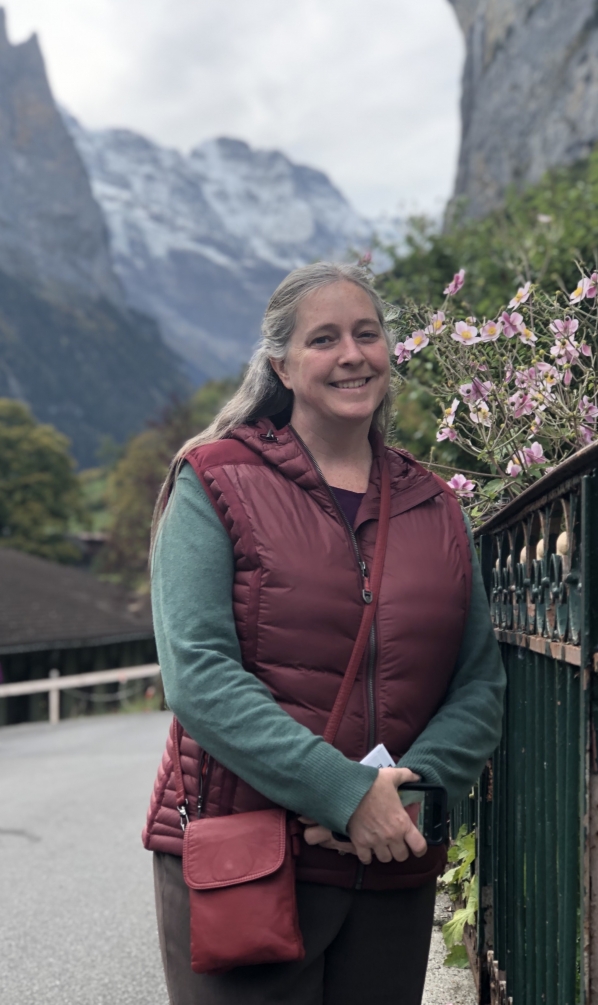SAFE Grant Student Spotlight: Laura Johnston ’99, ’19, Appalachian Studies
Laura Johnston was a graduate student from Deep Gap, N.C.
Two time Student and Faculty Excellence (SAFE) fund recipient
Projects: 2018 - "Capturing What We Knead: Collaborative Use of PhotoVoice to Improve Food Security in Appalachia"
2019 - “International Experiences within Reach for Nontraditional Students”
When Laura Johnston enrolled in graduate school as a non-traditional, part-time student (while working full-time) after graduating from Appalachian State University in 1999, traveling internationally as part of her education did not at first seem like a realistic goal. Thanks to the College of Arts and Sciences Student and Faculty Excellence (SAFE) fund, Johnston was able to travel to Canada in 2018 and Romania in 2019.
In Alberta, Canada, she attended the Thinking Mountains Interdisciplinary Summit and presented her research findings from her paper, “Photos to Food: Using PhotoVoice to Improve Food Security in Southern Appalachia.” The paper Johnston presented covered a year-long ethnographic field study completed with Grace Community Church in Marion, N.C., a small, southern Appalachian town.
Members of the Wellness Ministry focus on outreach to community members experiencing poverty, since there is a direct link between poverty, food insecurity and health issues such as obesity and diabetes. While working with the church, Johnston conducted a PhotoVoice project with members of the community experiencing food insecurity with support from mentor, Dr. Katherine Ledford, associate professor, Appalachian Studies. In addition to Ledford, Johnston also worked closely with Dr. Adam Hege, Dr. Chris Seitz and Dr. Erin Bouldin, all from the Department of Health and Exercise Science, Beaver College of Health Sciences to complete the project.
With PhotoVoice projects, cameras are put into the hands of the people experiencing a problem, giving a voice to people who might not otherwise have one. Leaders in the church are working closely with local government and non-profit agencies to try to improve health and wellness in the area and a mobile PhotoVoice exhibit is a vital tool in their efforts to make a true, positive impact in their community.
Another benefit to attending this conference was the opportunity for Johnston to connect with other Appalachian scholars, including faculty and students from the University of North Carolina at Asheville, the University of Kentucky, Emory & Henry College, Young Harris College, Indiana University and Virginia Tech. Areas represented by Appalachian State University included the Appalachian Studies program and the Department of Sustainable Development. In addition, at least one alumnus attended on behalf of the local organization, Blue Ridge Women in Agriculture (BRWIA).
“Attending the conference gave me new ideas about how to effectively continue my research on food security in Appalachia and how to positively impact food security in our community...I feel confident that in addition to the SAFE fund helping me as a student, it has also helped Appalachian State University as a whole become more widely recognized and highly regarded,” said Johnston.
In Brazov, Romania, Johnston attended the Appalachian-Carpathian International Conference. Conference attendees traveled to Petrosani and Petrila, Romania where they toured a decommissioned coal mine and met with a former mine employee, a local artist and activist and others working together on community development efforts. Johnston was able to share her research on food insecurity in southern Appalachia, and learn about other people's research in both the Appalachian and Carpathian Mountains.
She also provided a presentation titled “International Experiences within Reach for Nontraditional Students” at the 2019 Global Symposium in hopes of inspiring other students to pursue international education experiences.
“I was able to learn first-hand about the power of and the importance of community development,” said Johnston.
Participating in this conference allowed Johnston to meet other mountain scholars, many of which she remains in contact with. This experience strengthened her understanding of international mountain studies and of the similarities between the Appalachian and Carpathian Mountains.
“In October 2019, I was a 42-year-old graduate student who had never been to Europe. Simply being able to travel to Europe was a wonderful opportunity for me. My husband and I are now making it a priority to take our two sons—both of whom are currently in high school—to Europe within the next few years,” said Johnston.
Johnston completed her master’s degree in Appalachian Studies with a focus on sustainability in Appalachia and her B.A. in Interdisciplinary Studies - individually designed with minors in Appropriate Technology and Anthropology. She works for Appalachian in Facilities Operations and is a member of AppalFRESH (Appalachian Food Research for Equity, Sustainability, and Health) Collaborative.
###
About the Center for Appalachian Studies
The Center for Appalachian Studies promotes public programs, community collaboration, civic engagement and scholarship on the Appalachian region. The center is committed to building healthy communities and deepening knowledge of Appalachia’s past, present and future through community-based research and engagement. Learn more at https://appcenter.appstate.edu.
About the Department of Interdisciplinary Studies
The Department of Interdisciplinary Studies offers degrees in three program areas: global studies; gender, women’s and sexuality studies; and interdisciplinary studies. The department is also home to Watauga Residential College, an interdisciplinary, alternative general education program. The department promotes creative and imaginative engagement through a cross-disciplinary investigation of complex systems and problems. Learn more at https://interdisciplinary.appstate.edu.
About The SAFE Fund
Initially endowed by Hughlene and Bill Frank, the College of Arts and Sciences Student and Faculty Excellence (SAFE) Fund provides resources that can be used to support undergraduate, graduate and faculty experiences. The SAFE Fund provides funding for college priorities and opportunities that arise throughout the year. These unrestricted funds support student and faculty travel, publication support for faculty and student research opportunities. Learn more at: https://cas.appstate.edu/students/student-and-faculty-excellence-safe-fund.
Compiled and written by Barclay Ann Blankenship, Sophia Woodall and Ellen Gwin Burnette
March 4, 2021
BOONE, N.C.

